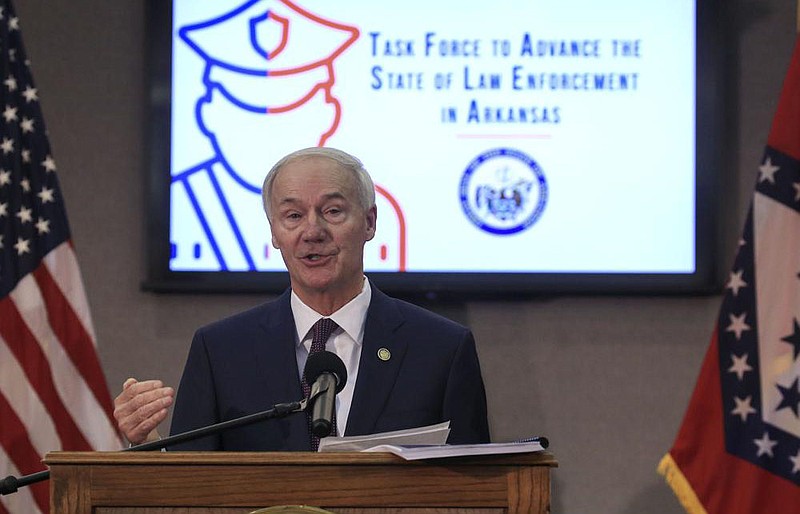Gov. Asa Hutchinson said Thursday that he will seek legislative approval to limit the use of part-time police officers in the state and to mandate that officers who are fired for use of excessive force or dishonesty be reported to a statewide database -- both ideas stemming from a task force's look into policing in Arkansas.
The Task Force to Advance the State of Law Enforcement in Arkansas, established by Hutchinson this summer after protests over a Minneapolis man's death while in police custody, unveiled its final report Thursday with a list of 27 policy recommendations.
Several of the recommendations will require legislative approval, Hutchinson said.
Among them is a recommendation that funding legislation be passed to equip all front-line officers with body cameras by 2026. Hutchinson said in the meantime, agencies will be encouraged to apply for grants to buy body cameras.
[Gallery not loading above? Click here for more photos » arkansasonline.com/1218law/]
The task force also recommended that the Legislature require all new police agencies to employ a full-time police chief.
Other recommendations, such as doubling the required annual bias training for police officers from two to four hours, can be done through executive action, Hutchinson said.
The task force included members of law enforcement agencies from around the state; representatives from advocacy groups, such as the Urban League and El Centro Hispano; as well as community activists who engaged in protests around the state after the May death of George Floyd.
Floyd, a 46-year-old Black man, died in Minneapolis after a white police officer knelt on his neck for several minutes while placing him under arrest for reportedly using a counterfeit $20 bill.
Task force chairman Fred Weatherspoon, the deputy director of the Arkansas Law Enforcement Training Academy, said the task force report ultimately did not address a proposed ban on police chokeholds, explaining that such maneuvers are not taught at the academy and are "not something we support."
Jimmy Warren, an activist from Conway who was appointed to the task force, said the group's discussions were respectful, even though some of the activists' concerns about chokeholds and reporting requirements were not included in the final report.
"There was a lot of agreeing to disagree," Warren said. While not everything was included in the recommendations, he said, "I do think that everyone's voice on the task force got heard."
The 2021 legislation session begins in January, at which point state lawmakers can consider some of the task force's recommendations.
"We've had some preliminary discussions with [lawmakers]," Hutchinson said Thursday. "I do believe that there will be broad interest and support, but they will want to go through their hearings and their debate on in."
Two senior Senate Republicans -- Judiciary Committee chairman Sen. Alan Clark, R-Lonsdale, and incoming Senate President Pro Tempore Jimmy Hickey, R-Texarkana -- said Thursday that they had not seen the task force report or been contacted about legislative recommendations by the governor.
"I want to take a look at what's been put out, but I haven't even received a copy yet," Hickey said Thursday.
Clark, when told of the recommendations to limit the number of part-time officers and of centralized misconduct reporting requirements, said the ideas ranged from "fairly innocuous" to "very good," but he wanted to review the report before supporting any legislation.
"At the same time we need reform, we don't need to be sending the message that all law enforcement is bad," Clark said.
He said he was additionally concerned about the wages of the lowest-ranking police officers, especially in smaller departments.
The task force report recommends that state, local and county governments work to ensure that police officers earn at or higher than the average annual wage in their area, however it does not recommend specific funding for any pay increases.
The report recommends legislation to exempt a portion of active-duty officers' salaries from the state income tax and to allow such officers to attend state colleges and universities tuition-free.

